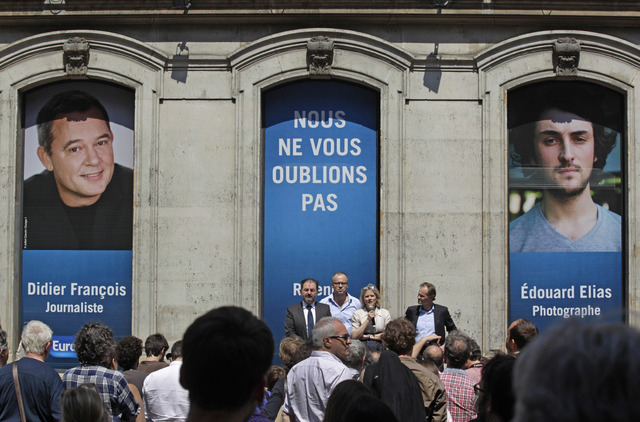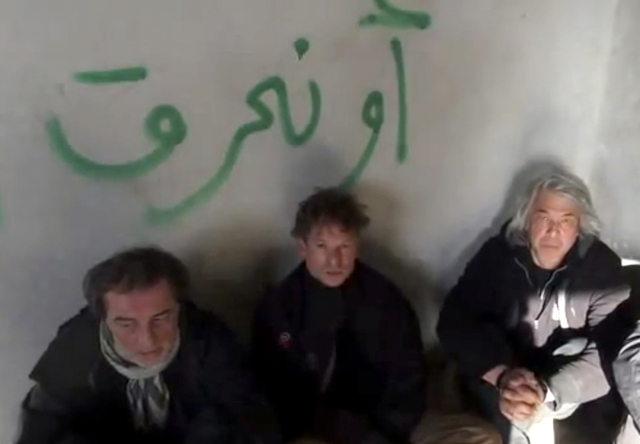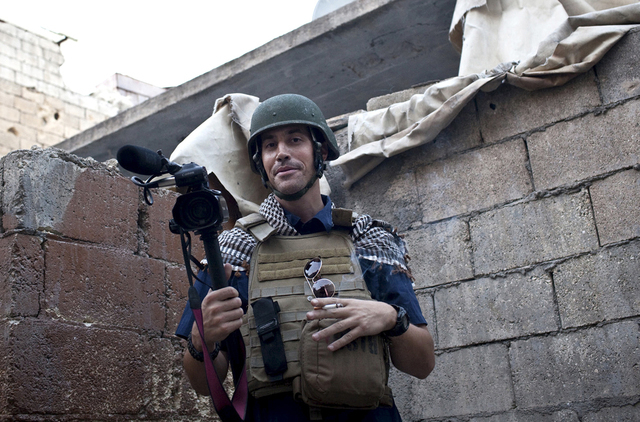News organizations keep mum to speed return of hostages
BEIRUT — Behind a veil of secrecy, at least 30 journalists have been kidnapped or have vanished in Syria, detained and threatened with death by extremists or taken captive by gangs seeking ransom.
The widespread seizure of journalists is unprecedented, and has been largely unreported by news organizations in the hope that keeping the kidnappings out of public view might help to negotiate the captives’ release.
The New York-based Committee to Protect Journalists says at least 30 journalists are being held and 52 have been killed since Syria’s civil war began in early 2011. The group also has documented at least 24 other journalists who disappeared earlier this year but are now safe. In a report this week, Paris-based Reporters Without Borders cited higher figures, saying at least 60 “news providers” are detained and more than 110 have been killed.
The discrepancy stems from varying definitions of what constitutes a journalist because much of the reporting and news imagery coming out of Syria is not from traditional professional journalists. Some of those taken have been activists affiliated with the local “media offices” that have sprouted up across opposition-held territory.
Only 10 of the international journalists currently held have been identified publicly by their families or news organizations: four French citizens, two Americans, one Jordanian, one Lebanese, one Spaniard and one Mauritanian. The remaining missing are a combination of foreign and Syrian journalists, some of whose names have not been publicly disclosed due to security concerns.
Groups such as the Committee to Protect Journalists are alarmed by the kidnappings.
While withholding news of abductions is understandable, especially with lives at stake, the organization admit it also masks the extent of the problem.
“Every time a journalist enters Syria, they are effectively rolling the dice on whether they’re going to be abducted or not,” said Jason Stern, a researcher at CPJ.
Jihadist groups are believed responsible for most kidnappings, but government-backed militias, criminal gangs and rebels affiliated with the Western-backed Free Syrian Army also have been involved with various motives.
By discouraging even experienced journalists from traveling to Syria, the kidnappings are diminishing the media’s ability to provide unbiased on-the-ground insights into one of the world’s most brutal and combustible conflicts.
And those who do go into the country from outside appear often to be among the less-prepared and less-protected, which in turn increases the chances of capture, deepening the fears and compounding the problem.
The kidnappings have helped shift the narrative of the war in a wider sense: What might have at first seemed to many like an idealistic rebellion against a despotic ruler now is increasingly viewed as a chaotic affair in which both anti-Western extremists and criminal gangs have gained dangerous influence
“It is vital that journalists witness and tell the story of the Syrian civil war,” said John Daniszewski, senior managing editor for international news at The Associated Press. “However, the impunity with which journalists are attacked and kidnapped in this conflict means that we must be doubly cautious. It is not an arena for novices, and extreme care needs to be exercised to obtain the news. At the same time, actors in the civil war must acknowledge and protect the right of journalists to cover it fairly and accurately as a basic human right.”
The spate of kidnappings has drawn comparisons to Lebanon during its vicious 1975-90 civil war, when Westerners, including then-AP Middle East Correspondent Terry Anderson, were taken captive by Muslim extremists and held for long periods.
In Iraq, 150 journalists were killed between the U.S. invasion in 2003 and the departure of American troops in 2011, a rate similar to the CPJ’s figures for Syria, but the numbers of abducted journalists was smaller. Reporters Without Borders said it registered 93 kidnappings of journalists there from 2003 to 2010, a far lower rate than it found in Syria. In Libya, a handful of journalists were detained during the war.
Stern said the kidnappings in Syria are unprecedented in scale: “Simply no other country comes close.”
Addressing the U.N. Security Council at a meeting in July, AP Executive Editor Kathleen Carroll, vice chairwoman of the Committee to Protect Journalists, said reporters serve as the public’s eyes and ears in conflict situations by going to places and asking questions that most people cannot.
Richard Engel, the chief foreign correspondent for U.S. television network NBC who was kidnapped by pro-Assad militiamen in northern Syrian and held for five days in December 2012, said journalists must reflect long and hard before going to the country.
“Because right now, if you go to into the rebel-held or contested areas in northern and eastern Syria, there is a very sizable percentage that you’re not going to make it out alive,” he said.
While reporting in Syria has always been a dangerous business, the risk has evolved during the uprising. Early on, President Bashar Assad’s government expelled foreign journalists covering anti-government protests. Scores of Syrian journalists were imprisoned. As rebels began seizing territory, some rebel factions began detaining journalists as well, often on unfounded accusations that they were spies.
Abductions increased significantly in recent months, as extremist groups grew more powerful in some areas.
Most of the kidnappings since the summer have taken place in rebel-held territories, particularly in chaotic northern and eastern Syria, where militant al-Qaida-linked groups dominate. Among the most dangerous places is the northeastern city of Raqqa, which was taken over by al-Qaida militants shortly after it became the first city to fall entirely into rebel hands; the eastern Deir el-Zour province; the border town of Azaz; and the corridor leading to Aleppo, once a main route for journalists going into Syria.
Among the longest-held captives are freelance U.S. journalists Austin Tice, missing since August 2012, and James Foley, who disappeared Nov. 22. Tice, who was one of few journalists reporting from Damascus when he vanished, is suspected of being held by the Syrian government, although his family has said they are uncertain who has him.
“Frankly, it makes no sense for us to speculate on who may be holding him and who may not be,” Tice’s father, Marc Tice, said. “We’re in a position where we are simply asking whoever does have influence, control or authority over whoever is holding Austin to have mercy on our family and return him to us.”
There has been no information on Foley.
Freelance U.S. photographer Matthew Schrier, who escaped in July from an Aleppo basement after seven months in captivity, said his captors tortured him for his credit card and bank passwords and used his money to shop on eBay.
In a harrowing account of his 152 days in Syrian rebel captivity, Italian journalist Domenico Quirico wrote in the daily La Stampa of a revolution gone astray.
“In Syria, I discovered the Land of Evil,” he wrote.





















